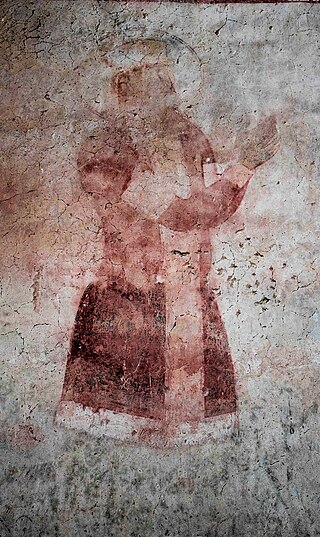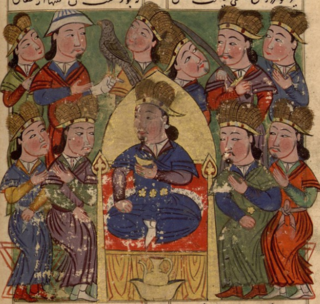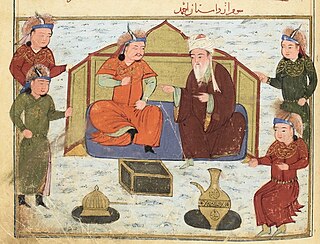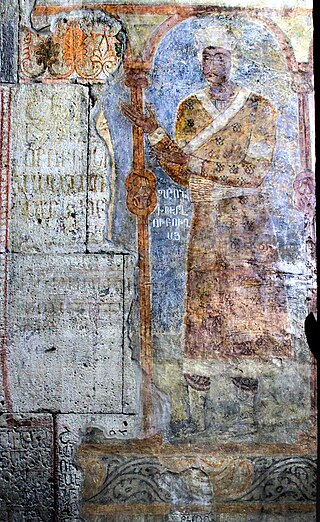
Hulegu Khan,also known as Hülegü or Hulagu,was a Mongol ruler who conquered much of Western Asia. Son of Tolui and the Keraite princess Sorghaghtani Beki,he was a grandson of Genghis Khan and brother of Ariq Böke,Möngke Khan,and Kublai Khan.

The Ilkhanate or Il-khanate was a Mongol khanate founded in the southwestern territories of the Mongol Empire. It was ruled by the Il-Khans or Ilkhanids,and known to the Mongols as HülegüUlus. The Ilkhanid realm was officially known as the Land of Iran or simply Iran. It was established after Hülegü,the son of Tolui and grandson of Genghis Khan,inherited the West Asian and Central Asian part of the Mongol Empire after his brother Möngke Khan died in 1259.

Abaqa Khan,was the second Mongol ruler (Ilkhan) of the Ilkhanate. The son of Hulagu Khan and Lady Yesünčin and the grandson of Tolui,he reigned from 1265 to 1282 and was succeeded by his brother Ahmed Tekuder. Much of Abaqa's reign was consumed with civil wars in the Mongol Empire,such as those between the Ilkhanate and the northern khanate of the Golden Horde,and the Chagatai Khanate in Central Asia. Abaqa also engaged in unsuccessful attempts at invading Syria under the Mamluk Sultanate,which included the Second Battle of Homs.

Ahmed Tekuder,also known as Sultan Ahmad,was the sultan of the Ilkhanate from 1282 to 1284. He was a son of Hulegu and brother of Abaqa. He was eventually succeeded by his nephew Arghun Khan.

Arghun Khan was the fourth ruler of the Mongol empire's Ilkhanate division,from 1284 to 1291. He was the son of Abaqa Khan,and like his father,was a devout Buddhist. He was known for sending several emissaries to Europe in an unsuccessful attempt to form a Franco-Mongol alliance against the Muslim Mamluks in the Holy Land. It was also Arghun who requested a new bride from his great-uncle Kublai Khan. The mission to escort the young Kököchin across Asia to Arghun was reportedly entrusted to Marco Polo. Arghun died before Kököchin arrived,so she Arghun's son Ghazan married her instead.

David VII,also known as David Ulugh (1215–1270),from the Bagrationi dynasty,was king (mepe) of Georgia from 1246 to 1270. He first ruled Georgia jointly with his namesake cousin,David VI,from 1246 to 1259. From 1259,David VI,revolting from the Mongol hegemony,seceded in the western half of the kingdom and formed the Kingdom of Western Georgia,while David VII was left to rule a reduced Kingdom of Georgia (1256–1329) in the region of eastern Georgia under Mongol control.

Mahmud Ghazan was the seventh ruler of the Mongol Empire's Ilkhanate division in modern-day Iran from 1295 to 1304. He was the son of Arghun,grandson of Abaqa Khan and great-grandson of Hulegu Khan,continuing a long line of rulers who were direct descendants of Genghis Khan. Considered the most prominent of the Ilkhans,he is perhaps best known for converting to Islam and meeting Imam Ibn Taymiyya in 1295 when he took the throne,marking a turning point for the dominant religion of the Mongols in West Asia:Iran,Iraq,Anatolia,and the South Caucasus.

Gaykhatu was the fifth Ilkhanate ruler in Iran. He reigned from 1291 to 1295. His Buddhist baghshi gave him the Tibetan name Rinchindorj which appeared on his paper money.
Shaikh Hasan,also known as "Hasan Buzurg",Hassan the Jalair or Hassan-e Uljatâï was the first of several de facto independent Jalayirid rulers of Iraq and central Iran.
Taghachar,also spelled Tajir,Ta'achar was a commander in the Mongol Empire's army. He was one of the conspirators involved in the overthrow of three Ilkhanate khans,and placed the short-lived Baydu on the throne in 1295.
Nawrūz was a son of governor Arghun Aqa and a powerful 13th-century Oirat emir who played an important role in the politics of the Mongol Ilkhanate.

Shams al-Din Juvayni was a Persian statesman and member of the Juvayni family. He was an influential figure in early Ilkhanate politics,serving as sahib-i divan under four Mongol Ilkhans –Hulagu,Abaqa,Tekuder and Arghun Khan. In 1284,Arghun accused Shams al-Din of having poisoned the Ilkhan Abaqa,who may actually have died of the effects of alcoholism;Shams al-Din was duly executed and replaced as vizier by Buqa. A skillful political and military leader,Shams al-Din is also known to have patronized the arts. The musician Safi al-Din al-Urmawi was one of those he supported.
Qonqurtai was a Mongol prince and viceroy of Anatolia for the Ilkhanate khanate.
Qutui Khatun was a Mongol princess and one of the wives of Il-Khan Hulagu,founder of Ilkhanate. Their son,Tekuder,briefly served as Il-Khan from 1282 until 1284. Khatun had an important role in state affairs during Tekuder's reign,and she was known as a protector of Christians.
Qurumushi or Qurmushi was an Ilkhanate commander of Keraite origin who served as Mongol viceroy of Georgia.

Khutlubuga,also Khutlu Buga or Qutlugh Buqa,was an Armenian prince of the House of the Artsrunids,and a court official of the Kingdom of Eastern Georgia in the second half of the 13th century,the son of Atabeg-Amirspasalar Sadun Mankaberdeli. He himself became Amirspasalar (Commander-in-Chief) of the Georgian army,and for a short time towards the end of his life Atabeg. He also received the title of Paron from the Armenian Kingdom of Cilicia. Khutlubuga and his father Sadun were attached the name of Artsruni in Armenian texts,and Mankaberdeli in Georgian ones.

The Kingdom of Eastern Georgia was the official prolongation of the Kingdom of Georgia from 1256 to 1329. Its rule was limited to the geographical areas of central and eastern Georgia,while the western part of the country temporarily seceded to form the Kingdom of Western Georgia under its own line of kings. The secession followed a transitional period when the rule of the Kingdom of Georgia was jointly assumed by the cousins David VI and David VII from 1246 to 1256. The entity split into two parts when David VI,revolting from the Mongol hegemony,seceded in the western half of the kingdom and formed the Kingdom of Western Georgia in 1256. David VII was relegated to the rule of Eastern Georgia. During his reign,Eastern Georgia went into further decline under the Mongol overlordship.

Alinaq Noyan (–1289) was a commander of the Il-Khanate and a Commander of Georgia. He was the son-in-law of the Il-Khanid ruler Tekuder. He may have been a son of Tügür Bitigchi,a commander of Hulegu.

Khoshak Zakarian,also Khuashak,Khvashak or Xvashak,was a female member of the Zakarid dynasty of Armenia in the 14th century CE. She was the daughter of Avag Zakarian,an important prince,Lord High Constable of Georgia,and Gvantsa,a noblewoman who went on to become queen of Georgia. She was the granddaughter of Ivane I Zakarian.













